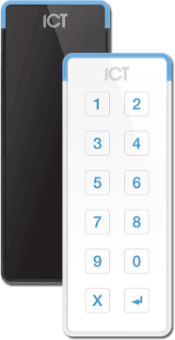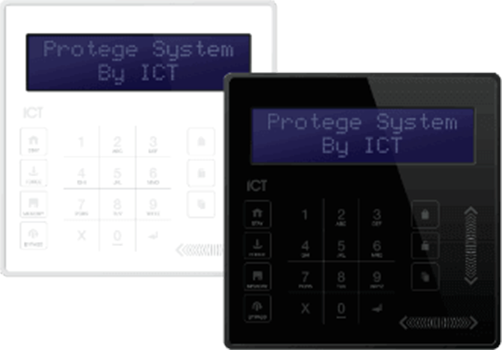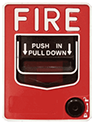Video MGMT System
 Access Control
Access Control
Voice & Data Wiring
 Burglar Alarm
Burglar Alarm
 Fire Alarm
Fire Alarm
Video MGMT System
Voice & Data Wiring
THOUGHT CENTER > Blog > Access Controls
November 8, 2023
Too busy to read? Here’s a summary:
In the context of physical security, access control systems refer to mechanisms that regulate and monitor who can enter a specific area, building, or room, thereby enhancing the security and safety of both people and assets within that space.
Keep reading to learn about the use of commercial access control systems across various sectors and how your business or organization can benefit from one.
The main purpose of access control is to provide a secure environment.
Physical access control systems regulate who can enter particular areas, buildings, or rooms. But it’s not just about keeping unauthorized people out; it's also about managing and monitoring the flow of people and assets within controlled areas.
By reducing the dangers of unauthorized access to protected spaces, access control systems keep people and assets safe.
Business Offices: From small startups to large corporations, physical access control is essential for entry management. Not only does it keep physical areas safe, but it also protects intellectual property and valuable assets from intruders.
Government Institutions: These facilities often house classified information that requires an extra layer of security. Automated entry management systems based on preprogrammed authorization rules ensure that only individuals with appropriate clearances can access controlled areas.
Healthcare Facilities: Physical access control systems in healthcare facilities maintain access log data for compliance with regulations, control access to valuable equipment and medications, automate visitor management policies, and limit employee access to only those resources they need to fulfill their duties.
Educational Institutions: Schools and universities are increasingly becoming targets for active shooters, making access control crucial. Modern access control systems offer advanced management features and automated emergency protocols that are instantly implemented as soon as emergency threats are detected.
Residential Buildings: High-rise apartments and gated communities also benefit from controlled access. Not only do they protect residents from external bad actors, but they’re also a highly desired amenity for current and future residents.
The main purpose (and most apparent benefit) of access control is enhanced security.
With a well-implemented access control system, unauthorized access attempts are not only rejected. Alerts can be automatically transmitted to appropriate administrators or other authorities.
This enhanced security provided by access control is particularly crucial in sectors like healthcare, where patient confidentiality is paramount, and in government institutions that handle sensitive information.
Modern access control systems are about more than security. They also improve operational efficiency by empowering authorized employees to access the areas they need without unnecessary delays.
Many industries have strict regulatory requirements when it comes to security. Physical access control systems provide detailed logs of who accessed what area and when making compliance audits a breeze.
While the initial investment might seem steep, the long-term benefits outweigh the costs. Reduced theft risk, improved operational efficiency, and easier compliance all contribute to a more cost-effective operation.
When selecting an access control system, consider the following:
Scalability: Can the right system grow and adapt to your organization?
Ease of Use: Is it user-friendly for both administrators and end-users?
Integration: Can it integrate with other systems like surveillance cameras or alarms?
Budget: What are the upfront and ongoing costs?
There’s a lot to consider when selecting an access control system that will cost-effectively meet your site security and management needs. For assistance selecting system components and for professional installation, reach out to the experts at Mammoth Security today. We’ll send a knowledgeable expert from our team to your site for a 100% FREE, zero-obligation site survey and consultation with a knowledgeable expert from our team.
You’ll find out why Mammoth Security is Connecticut’s one-stop shop for commercial-grade security systems—video surveillance, intrusion detection, fire safety, structured cabling, access control, and more.
NOT COMPLETELY SURE?
860-748-4292In the context of physical security, the main purpose of access control is to regulate and monitor who can enter specific areas, buildings, or rooms. It aims to provide a secure environment by managing the flow of people and assets within controlled areas, thereby reducing the dangers of unauthorized access.
The primary users of physical access control systems include businesses, government institutions, healthcare facilities, educational institutions, and residential buildings. These systems are essential for enhancing security, managing entry, and protecting valuable assets and information.
In healthcare facilities, the benefits of using access control systems include maintaining access log data for compliance with regulations, controlling access to valuable equipment and medications, automating visitor management policies, and limiting employee access to only the resources they need to fulfill their duties.
Access control systems enhance operational efficiency by allowing authorized employees to access the areas they need without unnecessary delays. This streamlined process contributes to a more productive work environment.
Access control systems play a crucial role in compliance and auditing by providing detailed logs of who accessed what area and when. This makes it easier for organizations to meet strict regulatory requirements related to security.
When choosing the right access control system, consider factors such as scalability, ease of use, integration capabilities, and budget. Assess whether the system can grow with your organization, if it's user-friendly for both administrators and end-users, as well as if it can integrate with other systems like surveillance cameras and alarms.